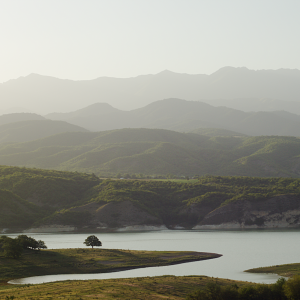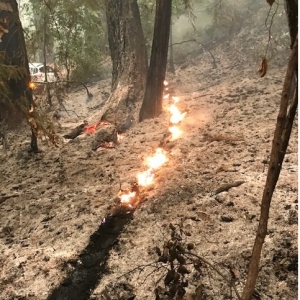Federal Water Tap, September 14: Regulator Warns of Climate Risk in Financial System
The Rundown
A financial regulator warns of climate risk and advocates for a carbon price. The Senate failed to pass a pandemic relief package. NOAA forecasters say that La Niña conditions have developed. The U.S. Fish and Wildlife Service releases a draft assessment of Oklahoma City’s plan to minimize harm to an endangered beetle while constructing a 100-mile water pipeline. The U.S. Geological Survey assesses groundwater quality in the western states. An inspector general’s report claims that FEMA is failing to adequately address repeatedly flooded properties. And lastly, a Senate committee will hold a hearing on the Clean Water Act while a U.S. Commission on Civil Rights committee will discuss water affordability in Massachusetts.
“Climate change poses a major risk to the stability of the U.S. financial system and to its ability to sustain the American economy.” — Excerpt from a U.S. Commodity Futures Trading Commission report on climate change and the financial system.
“La Niña can contribute to an increase in Atlantic hurricane activity by weakening the wind shear over the Caribbean Sea and tropical Atlantic Basin, which enables storms to develop and intensify.” — Mike Halpert, deputy director of NOAA’s Climate Prediction Center, discussing the development of La Niña. Federal climate forecasters said that the cyclical weather phenomenon has formed. La Niña tends to produce wetter weather in the northern states and drier conditions in the Southwest, which is already experiencing a severe drought. The pattern is likely to last through the winter.
By the Numbers
$800 million: Funding that would be authorized for groundwater and surface water storage projects in the western states under a bill introduced by Rep. T.J. Cox, a Democrat from California. (House)
73.6 degrees F: Average temperature for the June-August period in the United States, some 2.2 degrees above the 20th century average. It was the fourth warmest summer since record keeping began in 1895. (NOAA)
News Briefs
Climate Change and Financial System
A warming planet is a “major risk” to the U.S. financial system, with spillover effects for asset values, insurance markets, lending, borrowing, and employment, according to a wide-ranging report from a federal financial regulator.
The Commodity Futures Trading Commission report argues that a carbon price is necessary to reflect the societal cost of greenhouse gas emissions, that regulators should act more forcefully on risk disclosure, and that consistent risk reporting standards should be adopted.
“The central message of this report is that U.S. financial regulators must recognize that climate change poses serious emerging risks to the U.S. financial system, and they should move urgently and decisively to measure, understand, and address these risks,” the commission states.
In context: Water Crises Named the Biggest Business Risk in Four Countries
Senate Coronavirus Bill Fails
The Senate failed to pass a slimmed down version of its pandemic relief package, raising the question of whether additional action would be taken before the election.
A point of disagreement is aid to state and local governments. The Democratic-led House passed a bill in May that would provide $875 billion in additional support. Senate Republicans did not include any additional state and local aid in their proposal, which was voted down without Democratic support.
The CARES Act authorized $150 billion for this purpose. Some states, like North Carolina, are using those funds to provide financial assistance to water utilities and their customers.
Studies and Reports
Repeat Flood Losses
FEMA is failing to adequately reduce the risk to properties that repeatedly flood, according to an inspector general’s report.
The report says that FEMA does not have reliable information about which properties are at risk. These inaccuracies affect the property owner’s flood insurance rates. The agency also is slow to distribute mitigation funds, the report claims.
Groundwater Quality in the Western U.S.
The U.S. Geological Survey sampled untreated groundwater from six major aquifer systems used for drinking water in the American West.
Arsenic, fluoride, manganese, and total salts were the most commonly found contaminants at high concentrations.
Factors that influenced the type of groundwater contamination included geology, well depth, water age, proximity to urban areas, and climate.
In context: USGS Map Reveals Long-Term Changes in America’s Groundwater Quality
Oklahoma Drinking Water Pipeline
The U.S. Fish and Wildlife Services released a draft assessment of a conservation plan proposed by Oklahoma City, which aims to build a 100-mile water supply pipeline through an area inhabited by an endangered beetle.
FWS intends to approve the conservation plan, which will allow for inadvertent disruption and killing of some beetles as long as certain measures are in place: minimal land disturbance, work during daylight hours when the beetle is not active, and limiting stormwater erosion.
The American burying beetle is a federally protected species. The water pipeline from Atoka Reservoir to the Oklahoma capital, which will parallel an existing pipeline, will cross the beetle’s territory.
On the Radar
House PFAS Hearing
On September 15 at 1:00 p.m. Eastern, the House Armed Services Committee will discuss the Defense Department’s PFAS response. Three Defense Department officials will testify.
Senate Clean Water Act Hearing
On September 16 at 10:00 a.m. Eastern, the Senate Committee on Environment and Public Works will hold a hearing on the Trump administration’s rule that governs the scope of the Clean Water Act.
Massachusetts Drinking Water Affordability
On September 24 at 12:30 p.m. Eastern, a U.S. Commission on Civil Rights advisory committee will hold a public hearing to discuss its work on drinking water affordability and access in Massachusetts.
The dial-in number is 1-800-353-6461 and the conference ID is 7139515.
In context: Amid Rising Water Rates, Massachusetts Cities Have Inequitable Affordability Policies, Report Finds
Agriculture Water Use
The U.S. Department of Agriculture is seeking comments on technologies and practices that can reduce agriculture’s environmental footprint and boost yields.
The department says it wants to increase agricultural production by 40 percent by 2050 while cutting nutrient loss, food waste, and carbon emissions.
Comments must be received by November 9.
Federal Water Tap is a weekly digest spotting trends in U.S. government water policy. To get more water news, follow Circle of Blue on Twitter and sign up for our newsletter.
Brett writes about agriculture, energy, infrastructure, and the politics and economics of water in the United States. He also writes the Federal Water Tap, Circle of Blue’s weekly digest of U.S. government water news. He is the winner of two Society of Environmental Journalists reporting awards, one of the top honors in American environmental journalism: first place for explanatory reporting for a series on septic system pollution in the United States(2016) and third place for beat reporting in a small market (2014). He received the Sierra Club’s Distinguished Service Award in 2018. Brett lives in Seattle, where he hikes the mountains and bakes pies. Contact Brett Walton





Leave a Reply
Want to join the discussion?Feel free to contribute!